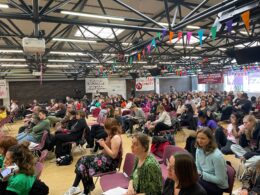In the first round of the French presidential elections, held on 22 April, François Hollande (28.6% vote) of the social democratic Socialist Party (PS) narrowly headed incumbent president Nicolas Sarkozy (27.1%) of the right wing Union for a Popular Movement (UMP). Both candidates face a run-off second ballot on 6 May in which Hollande is predicted to beat the much despised Sarkozy.
Most commentators emphasised the success of the far-right, xenophobic National Front (FN) candidate Marine Le Pen – who gained 17.9%, a high waterline for the FN. However, the most positive result, from a socialist standpoint, was the rapid rise in working class support for the Left Front (FDG) candidate Jean-Luc Mélenchon. The FDG secured 11.1% (nearly four million votes) on a left reformist platform of opposing the austerity cuts to pay for the capitalists’ economic crisis.
As expected, the New Anti-capitalist Party (NPA), whose popularity and membership have fallen dramatically because of its unclear programme and the false methods of its leadership, took a disappointing 1.15% (411,000 votes).
Mélenchon’s virtual overnight success came about because his skilful rhetoric tapped into a mood of burning anger among the working class against the rich elite and the capitalist policies pursued by the establishment parties.
Far right
Some of this mood was undoubtedly channelled by Le Pen, who capitalised both on people’s anger and uncertainties over the deepening euro crisis and the recent murders in Toulouse by a right-wing Islamist terrorist.
Nearly 80% voted in the first round. Le Pen has called for her supporters to abstain rather than support Sarkozy in the run-off, while Mélenchon has called for a vote for Hollande.
Despite the limitations of the Left Front programme (which essentially argues for reforming capitalist institutions instead of meaningful socialist change), Mélenchon’s successes – the tens of thousands who attended his rallies and four million votes – shows the potential for renewing the debate for building a new mass party to the left of the PS that can challenge capitalism.
Further analysis of the elections to come from Gauche Revolutionnaire (CWI in France) in the coming days.












